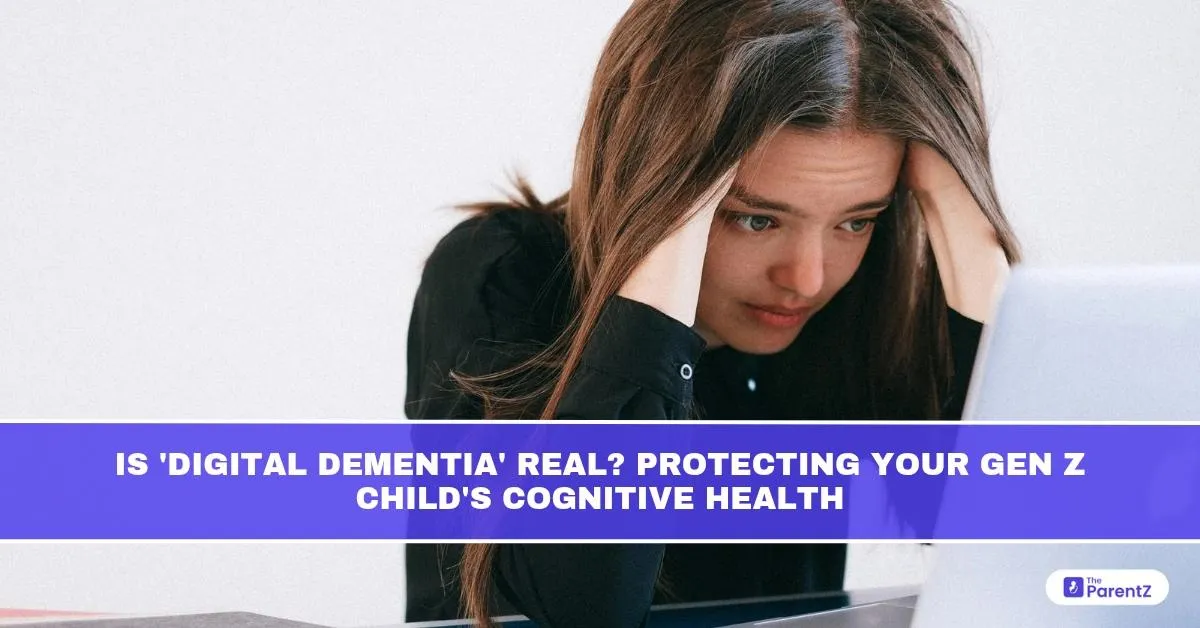Struggling with your Gen Z child? Don’t worry: we’ve got you covered
Between online classes, social media, video games, and endless scrolling, it often feels like today’s kids live more in the digital world than the real one. Many parents wonder if this constant screen exposure is affecting their child’s memory, attention, or even brain development. The term “digital dementia” has been making rounds but what does it really mean, and should you be concerned?
What is Digital Dementia?
“Digital dementia” is not an official medical diagnosis but a term coined by German neuroscientist Dr. Manfred Spitzer. It describes a pattern where overuse of digital devices appears to impair cognitive abilities like memory, attention span, and concentration, symptoms similar to those seen in early stages of dementia, but in much younger individuals.
Researchers suggest that when children rely heavily on devices for information, directions, or entertainment, they engage fewer brain regions involved in critical thinking, spatial navigation, and memory formation. Over time, this underuse may affect brain pathways, leading to difficulties in focus, remembering details, and problem-solving.
Why Are Gen Z Kids More at Risk?
Gen Z typically born between 1997 and 2012, has grown up surrounded by smartphones, tablets, and social media. Unlike previous generations, they never experienced a childhood without instant access to screens. This digital immersion starts earlier and is more intense than ever before.
Key reasons they’re at higher risk include:
- Early exposure: Many kids now use devices before age two, when their brains are highly plastic and sensitive to environmental input.
- Higher screen time: Studies show average screen use among children and teens can exceed 7 hours daily outside of schoolwork.
- Reduced offline activities: Excessive device use often replaces physical play, face-to-face conversations, and outdoor exploration, all vital for developing motor skills, social intelligence, and executive functions.
Signs Your Child May Be Experiencing Digital Overload
While every child is different, parents should watch for patterns such as:
- Frequent forgetfulness or trouble recalling information without looking it up.
- Difficulty concentrating on tasks, especially offline activities like reading or studying.
- Increased irritability, mood swings, or frustration when separated from devices.
- Poor posture, neck or back pain from prolonged device use (often called “tech neck”).
- Withdrawal from family interactions or outdoor play in favor of screens.
These signs don’t necessarily mean your child has digital dementia, but they do indicate it’s time to reassess screen habits.
What Does Science Really Say?
Research into “digital dementia” specifically is limited, but growing evidence shows excessive screen time can impact young brains in multiple ways. Studies using MRI scans have found:
- Changes in the brain’s white matter tracts, which support language, attention, and literacy skills.
- Delayed development of the prefrontal cortex, which governs impulse control and decision-making.
- Impaired memory consolidation in children heavily reliant on digital devices for information storage.
However, it’s important to note that moderate and purposeful screen use, like online learning, virtual collaboration, or creative activities, does not show the same negative effects. The problem arises with passive, prolonged, and unmonitored use.
How to Protect Your Child’s Cognitive Health
Here’s what you can do to nurture your Gen Z child’s brain in a digital world:
1. Set daily screen time limits
The American Academy of Pediatrics recommends no more than 1 hour of high-quality programming for children ages 2–5, and consistent limits for older kids. For teens, strive to keep recreational screen time under 2 hours per day.
2. Prioritize quality over quantity
Encourage content that teaches, inspires creativity, or helps them connect meaningfully with friends or family, rather than mindless scrolling or violent games.
3. Create screen-free zones
Make bedrooms, dining tables, and family gatherings device-free. This encourages better sleep, stronger family bonds, and mindful eating.
4. Encourage memory-building activities
Board games, puzzles, reading books, and storytelling stimulate memory, attention, and problem-solving areas often weakened by excessive screen reliance.
5. Promote physical activity
Outdoor play, sports, and hobbies not only support healthy brain development but also reduce stress, anxiety, and depressive symptoms associated with screen overuse.
6. Model balanced technology use
Children learn more from what you do than what you say. Set an example by managing your own screen time, putting devices away during conversations, and showing them how to enjoy offline moments.
7. Teach digital literacy
Help your child understand how technology works, its benefits, and its risks. Empowering them to use screens responsibly gives them a sense of control instead of fear or dependence.
When Should You Seek Professional Help?
If your child’s difficulties with memory, attention, or behavior persist despite efforts to reduce screen time, consider consulting a pediatrician, child psychologist, or neurologist. They can help rule out underlying conditions like ADHD, learning disabilities, or mood disorders that might require additional support.
A Compassionate Reminder for Parents
Remember, the goal isn’t to ban technology altogether. In today’s world, digital literacy is essential for social, academic, and future professional success. But balance is key. By being mindful and proactive, you can help your Gen Z child enjoy the best of what technology offers while protecting their growing brain.
Conclusion
Digital dementia may not be an official diagnosis, but it’s a real phenomenon reflecting the cognitive risks of unchecked screen time. As a parent, you’re not powerless; by understanding the signs and implementing practical strategies, you can nurture your child’s brain health and resilience. Let’s guide our children to thrive both online and offline, helping them build memories, focus, and skills that last a lifetime.





Be the first one to comment on this story.